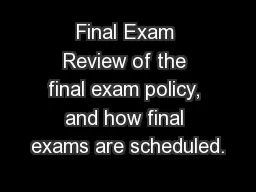PPT-Final Rule to Update the
Author : jaena | Published Date : 2024-02-09
Fair Labor Standards Act FLSA Manager amp Supervisor Training June 28 2016 Agenda Topics Overview of the Fair Labor Standards Act Department of Labor Final
Presentation Embed Code
Download Presentation
Download Presentation The PPT/PDF document "Final Rule to Update the" is the property of its rightful owner. Permission is granted to download and print the materials on this website for personal, non-commercial use only, and to display it on your personal computer provided you do not modify the materials and that you retain all copyright notices contained in the materials. By downloading content from our website, you accept the terms of this agreement.
Final Rule to Update the: Transcript
Download Rules Of Document
"Final Rule to Update the"The content belongs to its owner. You may download and print it for personal use, without modification, and keep all copyright notices. By downloading, you agree to these terms.
Related Documents














